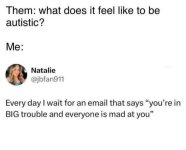Small talk is a huge waste of effort, and seems to involve a lot of encounters with NT stupidity.
I often have lunch with a friend at meetings so that we can sit there, the two NDs, in companionable silence unless one of us has a question or observation of substance to make. I have been suffering from NT overload recently, so I scheduled this week as being kind of free from 'peopling' responsibilities. What pushed me to take the break was that I was due a colonoscopy Tuesday and did not know I would react to the anesthesia. I did fine and was in-and-out of outpatient surgery in 2 hours.
The one public engagement I could not skip this week was an event to push a friend's book, but that is the only time I have had to deal with strange NT's this week. It wasn't too bad, and a glass of porter eased the remaining pain nicely.
I often have lunch with a friend at meetings so that we can sit there, the two NDs, in companionable silence unless one of us has a question or observation of substance to make. I have been suffering from NT overload recently, so I scheduled this week as being kind of free from 'peopling' responsibilities. What pushed me to take the break was that I was due a colonoscopy Tuesday and did not know I would react to the anesthesia. I did fine and was in-and-out of outpatient surgery in 2 hours.
The one public engagement I could not skip this week was an event to push a friend's book, but that is the only time I have had to deal with strange NT's this week. It wasn't too bad, and a glass of porter eased the remaining pain nicely.
